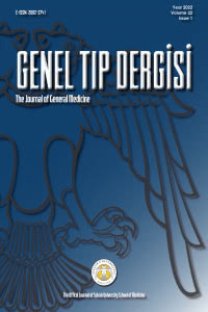Tekrarlayan gebelik kaybı olan hastalarda trombofili mutasyon sıklığının değerlendirilmesi
Evaluation of the frequency of thrombophilic mutations in patients with recurrent pregnancy loss
___
- 1. Dawood F, Farquharson R, Quenby S. Recurrent miscarriage. Curr Obstet Gynecol 2004;14:247-53.
- 2. Crosignani PC, Rubin BL. Recurrent spontaneous miscarriage. The recommendations of the ESHRE workshop on recurrent spontaneous miscarriage held in Anacapri. Hum Reprod 1991;6:609-10.
- 3. American Society of Reproductive Medicine (ASRM). Definitions of infertility and recurrent pregnancy loss. Fertil Steril 2008; 90:S60.
- 4. Warburton D,Fraser FC. Spontaneous abortion risks in man: data from reproductive histories collected in a medical genetic unit. Am J Hum Genet 1964; 16:1-25.
- 5. Coulam CB. Epidemiology of recurrent spontaneous abortion. Am J reprod Immunol 1991: 26:23-7.
- 6. Regan L, Braude PR,Trembath PL. Influence of post reproductive performance on risk of spontaneous abortion. BMJ 1989;299:541-5.
- 7. Clifford K, Rai R, Regan L. Future pregnancy outcome in unexplained first trimester miscarriage. Hum Reprod 1997;12:387-9
- 8. Plachor M,Junca AM, Mandelbaum J, de Grouchy J, Salat-Baroux J, Cohen J. Chromosome investigations in early life. II. Human preimplantation embryos. Hum Reprod 1987; 2:29-35.
- 9. Carp H, Salomon O, Seidman D, Dardik R, Rosenberg N, Inbal Aida. Prevalence of genetic markers for thrombophilia in recurrent pregnancy loss. Hum Reprod 2002; 17: 1633-37.
- 10. Bick RL, Hoppensteadt D. Recurrent miscarriage syndrome and infertility due to blood coagulation protein/platelet defects: A review and update. Clin App Thromb Hemost 2005;11:1-13.
- 11. Foka ZJ, Lambropoulos AF, Saravelos H, et al. FactorV Leiden and prothrombin G20210A mutations, but not methylenetetrahydrofolate reductase C677T, are associated with recurrent miscarriages. Hum Reprod 2000; 15: 458- 62.
- 12. Pauer HU, Voig-Tschitschwitz T, Hinney B, Burfeind F, Wolf C, Emons G, et al. Analyzes of three common thrombophilic gene mutatons in German women with recurrent abortions. Acta Obstet Gynecol Scand 2003; 82: 942- 7.
- 13. Kujovich JL. Thrombophilia and pregnancy complications. Am J Obstet Gynecol 2004; 191:412- 24.
- 14. Tepeli E, Müslümanoðlu MH, Uludağ A, Atlı E, Uzun D, Artan S. Eskişehir ilinde idiyopatik tekrarlayan gebelik kayıpları ile Metilentetrahidrofolat redüktaz (MTHFR) C677T ve A1298C polimorfizmleri arasındaki ilişki. Osmangazi Tıp Derg 2007; 29:1-11.
- 15. Nelen WL, Blom HJ, Steegers EA, den Heijer M, Eskes TK. Hyperhomocysteinemia and recurrent early pregnancy loss: a meta-analysis. Fertil Steril. 2000; 74:1196-9.
- 16. Şahin FI, Ataç B, Yılmaz Z, Zeyneloğlu HB. Tekrarlayan Gebelik Kayıplarında Trombofili Mutasyon Sıklıkları. Erciyes Tıp Derg 2009;31:104-9.
- 17. Grandone E, Margaglione M, Colaizzo D, D'Andrea G, Cappucci G, Brancaccio V, et al. Genetic susceptibility to pregnancy-related venous thromboembolism: roles of factor V Leiden, prothrombin G20210A, and methylenetetrahydrofolate reductase C677T mutations. Am J Obstet Gynecol 1998;179:1324-8.
- 18. Mtiraoui N, Borgi L, Hizem S, Nsiri B, Finan RR, Gris JC, et al. Prevalence of antiphospholipid antibodies, factor V G1691A (Leiden) and prothrombin G20210A mutations in early and late recurrent pregnancy loss. Eur J Obstet Gynecol Reprod Biol 2005; ;119:164-70.
- 19. Rey E, Kahn SR, David M, Shrier I. Thrombophilic disorders and fetal loss: a meta-analysis. Lancet. 2003; 361:901-8.
- 20. Dizon-Townson DS, Nelson LM, Jang H, Varner MW, Ward K. The incidence of the factor V Leiden mutation in an obstetric population and its relationship to deep vein thrombosis. Am J Obstet Gynecol. 1997; 176:883-6.
- 21. Sarig G, Younis JS, Hoffman R, Lanir N, Blumenfeld Z, Brenner B. Thrombophilia is common in women with idiopathic pregnancy loss and is associated with late pregnancy wastage. Fertil Steril 2002; 342-7.
- 22. Kutteh WH, Park VM, Deitcher SR. Hypercoagulable state mutation analysis in white patients with early first- trimester recurrent pregnancy loss. Fertil Steril 1998; 71: 1048-53.
- 23. Kupferminc MJ, Eldor A, Steinman N, Many A, Bar-Am A, Jaffa A, et al. Increased frequency of genetic thrombophilia in women with complications of pregnancy. N Engl J Med 1997;340:9-13. Erratum in: N Engl J Med 1999;341:384.
- 24. Thorarensen O, Ryan S, Hunter J, Younkin DP. Factor V Leiden mutation: an unrecognized cause of hemiplegic cerebral palsy, neonatal stroke, and placental thrombosis. Ann Neurol. 1997;42:372-5.
- 25. Dudding TE, Attia J. The association between adverse pregnancy outcomes and maternal factor V Leiden genotype: a meta-analysis. Thromb Haemost 2004;91:700-11.
- 26. Sotiriadis A, Vartholomatos G, Pavlou M, Kolaitis N, Dova L, Stefos T, et al. Combined thrombophilic mutations in women with unexplained recurrent miscarriage. Am J Reprod Immunol 2007; 57:133- 41.
- ISSN: 2602-3741
- Yayın Aralığı: Yılda 6 Sayı
- Başlangıç: 1997
- Yayıncı: SELÇUK ÜNİVERSİTESİ > TIP FAKÜLTESİ
Atipik klinik özellikleriyle dikkat çeken bir Kaposi sarkomu olgusu
BERNA AKSOY, HASAN METE AKSOY, Aslı Altaykan HAPA, Müzeyyen ASTARCI, Mahi BALCI
Hastane çalışanlarında ağrının lokalizasyonu ve yoğunluğunun aktivite ile ilişkisi
ALİS KOSTANOĞLU, İpek YELDAN, AYŞE ZENGİN ALPÖZGEN, Anıl TEKEOĞLU, DEVRİM TARAKCI, TUĞBA KURU ÇOLAK, Yıldız Analay AKBABA
Sema Dereli YILMAZ, Nezihe Kızılkaya BEJİ
Çekirdekli eritrositlerin hastane ölümlerinde risk belirleyici rolü
A. Erkin BOZDEMİR, Burcu BARUTÇUOĞLU, Ceyda KABAROĞLU, H.Saygın DEMİREL, Sara HABİF, Mehmet UYAR, Oya BAYINDIR, Dilek ÖZMEN, Ali Reşat MORAL
Docetaxel kullanımına bağlı bir palmoplanter eritrodizestezi sendromu olgusu
Gibboziteye neden olan ve tedavi altında farklı seviyede reaktivasyon gösteren Pott Hastalığı
Erdal KALKAN, Fatih ERDİ, FATİH KESKİN, Kemal İLİK, Yaşar KARATAŞ
Tekrarlayan gebelik kaybı olan hastalarda trombofili mutasyon sıklığının değerlendirilmesi
Suna ÖZDEMİR, Osman BALCI, Halime GÖKTEPE, Hüseyin GÖRKEMLİ, Elmas TAŞÇI, Hasan ACAR
AHMET ÖNDER GÜNEY, Yalçın KOCAOĞULLARI, MEHMET FATİH ERDİ, Bülent KAYA
